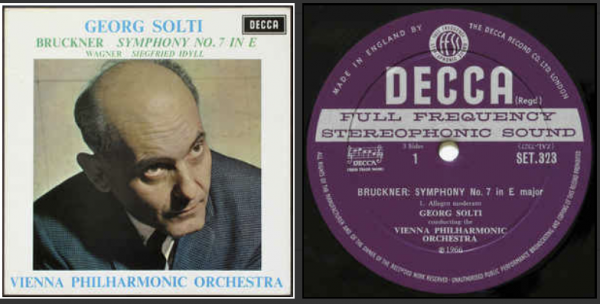I received my copy this past week but haven’t played it as I finally received all the goodies I need to set up my Dohmann Helix 1 Mk2 and Reed 3P/ZYX Uni Premium so I’ve been, shall we say…a bit distracted with set-up duties.
It’s interesting to see some of the reactions some have had to the 7th Symphony. We all know that it’s easy to listen to a piece of music and gain an impression of its relative musical pleasure without knowing anything more about the piece or the composer. That’s often eass to do with some types of classical music more than others. But sometimes, I find that knowing a bit about the composer and understanding the purpose of the piece can be very helpful in appreciating the work as well as the performance. I find this is particularly true with the large symphonic works of the Romantic repertoire. Here are some thoughts on Bruckner that might translate to your enjoyment as you contemplate this masterwork.
First, I’d like to refer to some comments I made last November after hearing Bruckner’s 4th at Carnegie (post 656) quoted below.
https://www.whatsbestforum.com/threads/recent-concerts-youve-enjoyed.3840/page-33#post-610517
“As far as Bruckner, it always impressed me that as a peasant from North Austria who was known for his baggy pants and shabby clothes, his devout Catholicism would translate to such majestic, noble and elegant writing which was typically about the glory of God. His 4th is no exception. It’s a big piece and full of grand and powerful expressions that remain a high water mark of the romantic repertoire. Bruckner’s themes are very long and built cumulatively from many elements. If Beethoven’s themes can be likened to pithy sentence fragments, Bruckner’s are fully developed paragraphs. Bruckner was an organist and left his playing days behind him to enter the Vienna Conservatory as a teacher of composition at the relatively late age of 44. He wrote his last 8 symphonies from that point on. His regard as a composer of great stature is why there is a “school “named after him – the Viennese School of composition (often called the Bruckner/Viennese school) which has invariably been mastered by most great conductors since then.
Bruckner certainly knew how to write for brass! (Who do you think taught Mahler, 36 years Bruckner’s junior, to write for brass?) The orchestra for this piece swelled from about 75 players to well over 100 and they certainly rocked the hall (or more appropriately, with the horns and brass, they blew the roof off). It is most fitting that Bruckner’s 4th symphony received its Carnegie Hall premier in 1910 with Gustav Mahler conducting the NY Philharmonic. Cool stuff!.
The 4th is a big and complex piece that requires focused attention to absorb its myriad of harmonic and rhythmic themes. I particularly liked the slow movement which has been likened to a veiled funeral march. But instead of the anguish we always hear in Mahler’s funeral marches, there is gentle tenderness and sorrow in Bruckner, who saw death not as an end but as the beginning of a full union with God. In my view, Mahler certainly achieves the full acceptance of God equally well, (i.e., the 2nd and the 9th) but it’s as if he always asks God along the way, “why are you crapping on my head all the time”? Bruckner was a far less contentious believer.”
Regarding the 7th which BBC Music Magazine lists as the 20th greatest symphony of all time (it lists Bruckner’s 8th as the 13th greatest), it was written in 1883. (Anybody want to name a classical work written today that will be played and revered 140 years from now?) Perhaps the best overview of Bruckner’s symphonies is a description written by Deryck Cooke (the musicologist/composer who completed Mahler’s 10th in 1960 which premiered in 1964 at the Proms by the LSO).
“Despite its general debt to Beethoven and Wagner, the “Bruckner Symphony” is a unique conception, not only because of the individuality of its spirit and its materials, but even more because of the absolute originality of its formal processes. At first, these processes seemed so strange and unprecedented that they were taken as evidence of sheer incompetence…. Now it is recognized that Bruckner’s unorthodox structural methods were inevitable…. Bruckner created a new and monumental type of symphonic organism, which abjured the tense, dynamic continuity of Beethoven, and the broad, fluid continuity of Wagner, in order to express something profoundly different from either composer, something elemental and metaphysical…his extraordinary attitude to the world, and the nature of his materials which arose from this attitude, dictated an entirely unorthodox handling of the traditional formal procedures. Sonata form is a dynamic, humanistic process, always going somewhere, constantly trying to arrive; but with Bruckner firm in his religious faith, the music has no need to go anywhere, no need to find a point of arrival, because it is already there…Experiencing Bruckner’s symphonic music is more like walking around a cathedral, and taking in each aspect of it, than like setting out on a journey to some hoped-for goal.”
I really related to the last sentence as that is the feeling I had walking around the Sagrada Familia in Barcelona. The 7th tries to capture that and more as its all about the sacred and religious faith, which are always the main themes of Bruckner’s symphonies. Sometimes knowing a bit of the composer’s back story and objectives is what can make the difference between immersion and appreciation of the piece and....falling asleep.! Enjoy.







